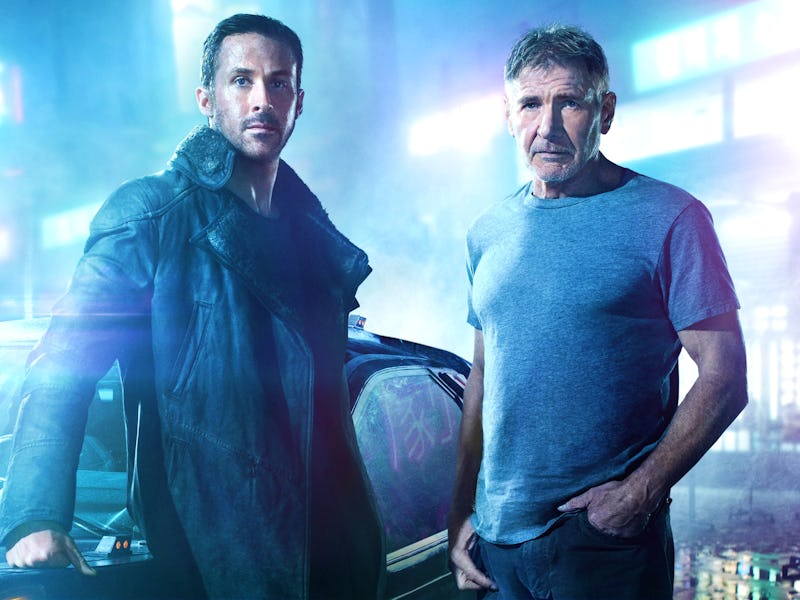'Blade Runner 2049': Reviews Say It Lives Up to the Original
No tears in the rain here.

Blade Runner’s future seems to be one that everyone, fan of the original or not, has to see. Following Tuesday’s glowing social media reactions to the film, reviews started to come out for Blade Runner 2049 on Friday. And it looks like the film is pretty much what many thought was impossible: a great sequel to the 1982 classic.
Variety’s Peter Debruge was quick to say that 2049 doesn’t exactly reinvent the wheel, but by aligning with the vision of original Blade Runner director Ridley Scott, director Denis Villeneuve further explores the first film’s central questions.
The world as we know it has nearly caught up to the one Ridley Scott imagined when he directed the 2019-set “Blade Runner,” and yet, for all the influence the dystopian cult favorite has had on other sci-fi movies, Scott’s vision of Los Angeles still looks as mind-blowingly futuristic now as it did in 1982.
Debruge adds that the sequel doesn’t rely too much on knowledge of the previous film, and may work better without having seen the original:
Sure as it is to delight “Blade Runner” fans, this stunningly elegant follow-up doesn’t depend on having seen the original — and like 2010’s “Tron: Legacy,” may actually play better to those who aren’t wedded to the franchise’s muddled off-screen mythology.
Peter Bradshaw from The Guardian offered an exciting look at the film’s sheer visual and conceptual ambition, writing that:
Its mind-boggling, cortex-wobbling, craniofacial-splintering images are there to trigger awe or even a kind of ecstatic despair at the idea of a post-human future, and what it means to imagine the wreck of our current form of homo sapiens. Evolution has not finished yet, any more than it was finished 100,000 years ago. As so often in literature and cinema, we are reminded that science fiction is there to tackle big ideas, and makes realist genres look flimsy and parochial. This film delivers pure hallucinatory craziness that leaves you hyperventilating.
Harrison Ford in the original 'Blade Runner'
Wired’s Bryan Lafferty echoed Bradshaw’s comments, remarking that the real world might disappoint you after you experience the film.
This is a movie about the aftershocks of evolution—emotional, physical, global—and after watching it, you might feel slightly altered yourself, as Blade Runner 2049 is so mesmeric, so thoroughly transportive, that the real world waiting outside of the theater will strike you as bit of a let-down. It’s the sort of big-budget, big-idea sci-fi film that seems all but impossible these days.
The Verge’s Bryan Bishop had a more lukewarm take on the film as a whole, writing that the film is ambitious — with incredible visuals and a great addition in the form of Ryan Gosling as K — but it doesn’t quite live up to the original:
The good news is that Villeneuve’s film is every bit the original’s equal when it comes to breathtaking visuals and design, and Ryan Gosling is perfectly cast as K, the newest blade runner on the hunt for renegade “skin jobs.” The film ultimately doesn’t have the resonance and pure invention of the original, and over its nearly three-hour run time, that becomes increasingly clear. But it’s certainly not for lack of trying.
Entertainment Weekly’s Leah Greenblatt had similar thoughts on the film’s aesthetics and runtime, but still thought it earned an impressive “A-“ grade:
Villeneuve, one of the few filmmakers working today for whom the word auteur doesn’t sound like an unearned affectation, may have fallen a little too in love with his own creation; at two hours and 40 minutes, aesthetic shock and awe eventually outpace the narrative. But how could he not, when nearly every impeccably composed shot — a surreal six-handed love scene; a shimmering hologram of Elvis, hip-swiveling into eternity; a “newborn” replicant, slick with amniotic goo — feels like such a ravishing visual feast? Even when its emotions risk running as cool as its palette, 2049 reaches for, and finds, something remarkable: the elevation of mainstream moviemaking to high art.
And for those curious about Jared Leto and Harrison Ford’s performances in the film, Time Magazine’s Stephanie Zacharek probably had the most humorous and succinct opinions:
[The Sylvia Hoeks-played android Luv’s] boss is Jared Leto’s Wallace, a mad guru and android-making artiste who’s both sightless and all-seeing. His eyes are milky orbs that ought to be spooky, except come on, we all know it’s just Jared Leto with contact lenses.
Deckard, older and, if you can believe it, even crustier, shows up too. Ford shrugs through a role that doesn’t really ask that much of him.
So, the film runs a little long in the tooth, and some performances — or at least, some costume decisions — aren’t all that great. But 2049’s ideas and visuals, part of why the first Blade Runner is so revered today, are at the very least on par. For a refresher on a film that could very well make the real world seem like a “let-down,” check out the first trailer here:
Blade Runner 2049 will be in U.S. theaters on October 6.
If you liked this article, check out this video on practical effects in Blade Runner 2049.